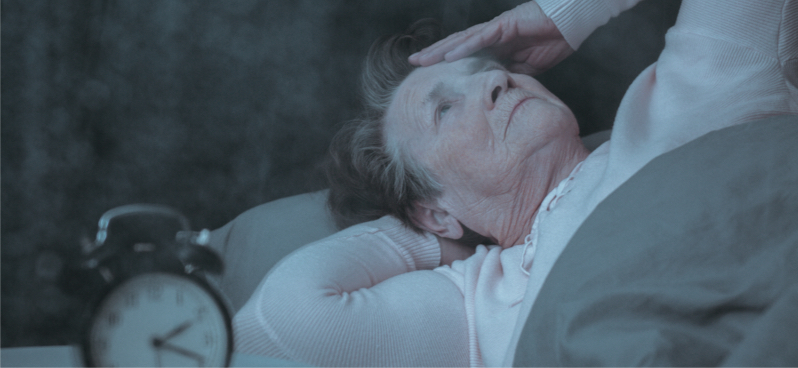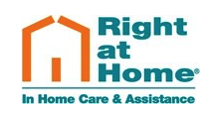
01 Jul Addressing Later-Life Sleep Problems

Addressing Later-Life Sleep Problems
Some changes in our sleep patterns are perfectly normal as we grow older. Older adults tend to go to sleep earlier in the evening, and wake up earlier in the morning. Research shows that older adults may need a little less sleep than they did in younger years. This is good to know, because, ironically, worrying about our sleep can actually make it harder to sleep!
“But not all the sleep changes seniors experience are normal,” notes Doug Dickstein, President of Right at Home in Burbank/Glendale. Dickstein says that incontinence, pain from arthritis or osteoporosis, digestive problems, and the side effects of certain medications can affect sleep. Sleep problems can even be a long-term effect of COVID-19. Managing these health conditions can help our sleep—so important, because sleep problems are linked with memory loss, depression, high blood pressure, irritability that affects our relationships, and a lack of alertness that can cause falls and car accidents.
Dickstein says families should urge older loved ones to seek help for sleep problems. Their doctor may refer them to a specialist for a sleep study, which might include a portable sleep monitor at home, or could take place in a sleep laboratory.
Here are some common conditions sleep specialists address:
Insomnia. Older adults with insomnia might have trouble falling asleep. Or, they might drift off, only to wake up a few hours later, or wake many times during the night, then feel sleepy during the day. Sleep specialists might recommend lifestyle changes, such as getting more exercise, avoiding caffeine, and improving the sleep environment. Treating anxiety can help. Medications might be prescribed, though this is the last choice.
Sleep apnea. This condition causes a sleeper to stop breathing for short periods—from a few seconds to even minutes, often repeatedly throughout the night. Sleep apnea may be accompanied by loud snoring, but not always. It can cause a dangerous drop in a person’s oxygen level and can disrupt sleep all night, raising the risk of high blood pressure, stroke and memory loss. The sleep specialist might prescribe a constant positive airway pressure (CPAP) breathing device, or a mouthpiece that adjusts the jaw position. Sometimes surgery is recommended.
Sleep-related movement disorders. We all shift position occasionally during the night. But abnormal movements at night can disturb sleep considerably. These include restless legs syndrome, in which a sleeper experiences unpleasant sensations in the limbs resulting in the urge to shift position frequently. Periodic limb movement disorder creates repetitive movements in the limbs for long periods of time. People with sleep-related bruxism clench their jaws and grind their teeth while asleep. Treatments might include lifestyle changes, addressing underlying health conditions, or medication.
Dementia-related sleep problems. “The brain changes of Alzheimer’s disease and related disorders can disrupt a senior’s sleep patterns,” says Dickstein. “Some people with dementia may sleep too much, while others have trouble sleeping much at all. The disease disrupts the body’s natural 24-hour sleep and wake cycle, leaving a person’s sense of day and night reversed and fragmented.” Dickstein says dementia care experts can offer suggestions to improve sleep, such as changing the person’s nighttime routine, diagnosing a urinary tract infection, or considering medication side effects.
Daytime napping. “It’s a bit of a stereotype that older adults take a lot of naps,” says Dickstein. “Plenty of people of every age take naps, and in some cultures, it’s considered a usual activity of the day. Napping can be beneficial, but also can interfere with sleep at night, so it is something else people with sleep problems should discuss with the doctor.”
Second-hand sleep problems
When a person has a sleep disorder, this can affect their sleep partner or others in the home. “A snoring spouse is the classic example,” says Dickstein. “Earplugs or sleeping in a different room can help. The sleep of family caregivers also can be regularly disrupted if they need to get up at night to help their loved one to the bathroom.”
People with dementia may exhibit “sundown syndrome,” when in the late afternoon and early evening, just as the caregiver is most tired, their loved one becomes restless, agitated and very much awake. The person may resist going to bed, refuse to stay in bed, and get up again and again in the night, leaving the caregiver exhausted the next day. Studies show that sleep problems are the No. 1 factor when families decide a person with dementia should no longer live at home, but in a care setting.
Home care can help.
Professional in-home care services promote good sleep and all-around health for older adults who live at home. Trained caregivers can provide supervision while family caregivers sleep. Professional caregivers help clients manage medical appointments and medications, get enough exercise, and eat well. They provide mental stimulation during the day that helps clients wind down for the evening. They ensure that the home is safe for clients who get up at night.
“If a loved one has dementia, it’s important to hire from an agency that trains its caregivers on memory care issues,” says Dickstein. “But no matter what the cause of sleep problems, professional caregivers provide peace of mind—and that might be the best ‘sleep medication’ there is!”
About Right at Home
Founded in 1995, Right at Home offers in-home companion and personal care and assistance to seniors and disabled adults who want to continue to live independently. Right at Home directly employs all caregiving staff, each of whom are thoroughly screened, trained, bonded and insured prior to entering a client’s home. Right at Home is based in Burbank, California and services the entire Greater Los Angeles area, including all of the San Fernando Valley, Hollywood, Beverly Hills, Santa Clarita and the Antelope Valley. For more information about Right at Home contact www.rahlosangeles.com, 818-956-5905 or by email at info@rahglendale.com. Read the Right at Home caregiving blog at www.rightathome.net/glendale/blog. To sign up for Right at Home’s free adult caregiving eNewsletter, Caring Right at Home, visit http://www.rightathome.net.




Sorry, the comment form is closed at this time.